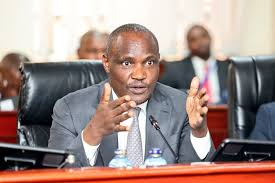
The proposed law seeks to establish the Kenya Sovereign Wealth Fund, to provide institutional arrangements for effective administration and efficient management of minerals and petroleum revenues, and monies from other sources allocated to the Fund.
The Kenya Sovereign Wealth Fund will have three components: a stabilisation unit, an infrastructure investment arm and a segment focused on savings, according to the draft Sovereign Wealth Fund Bill 2025.
Kenya’s partner in the East African Community, Rwanda, is among the 32 countries with similar funds.
The Agaciro Development Fund (AGDF) was launched 12 years ago and is currently valued at about US$244,857,600.
As of 2025, the total assets managed by African Sovereign Wealth Funds (SWFs) are estimated to be around US$300 billion (about Sh39 trillion).
Currently, the largest sovereign wealth fund in Africa is led by Ethiopia with US$46 billion, followed by Algeria with US$13 billion, and Zambia with US$6 billion.
Other African countries in the top ten list of SWFs include Botswana US$4 billion, Morocco US$3 billion, Nigeria US$3 billion, Tunisia US$ 3 billion, South Africa US$3 billion, Angola at Ghana at US$2 billion each.
Globally, Norway leads the list with a US$1.8 trillion fund, followed by China’s two biggest funds, holding US$2.4 trillion in assets.
The United Arab Emirates and Kuwait are listed at 4th and 5th with slightly above US$1 trillion in funds, while ranking sixth is Saudi Arabia’s Public Investment Fund, with US$925 billion in assets.
But what is a Sovereign Wealth Fund?
A Sovereign Wealth Fund (SWF) is a state-owned investment fund that governments use to invest surplus revenues and other financial reserves.
According to the International Forum for Sovereign Wealth Funds (IFSWF), a sovereign wealth fund is owned by the general government, which includes both the central government and sub-national governments and includes investments in foreign financial assets invested for financial objectives.
According to the Director of Strategy & Communications, IFSWF Victoria Barbary, despite governance challenges, many African SWFs have succeeded in positioning themselves as key facilitators of investment in critical sectors like infrastructure, renewable energy, and private sector development.
“Although Africa is rich in natural resources, many of the sovereign wealth funds on the continent are not traditional savings funds used to manage fiscal surpluses. Instead, the majority of these funds are strategic investment funds, which have been conceived in the context of scarce available resources,” she says.
Many of the countries that use sovereign wealth funds (SWFs) have economies that are heavily reliant on one source of income, for example, oil revenues in Norway and the Middle East, according to the World Economic Forum.
Other countries with sovereign wealth funds that are financed from oil and gas revenues include Abu Dhabi, Kuwait, Saudi Arabia and Qatar.
The National Treasury Cabinet Secretary, John Mbadi, has called on members of the public and other stakeholders to submit their views on the draft Kenya Sovereign Wealth Fund Bill, 2025, which seeks to provide a legal framework for the management of natural resource revenues in Kenya responsibly.
“In ensuring openness and accountability in public financial matters and in compliance with articles 201(a) and 232 (1) (d) of the Constitution, the National Treasury hereby invited members of the public, NGOs, civil societies, professional bodies, private sector players, religious groups and other stakeholders to make submissions on the draft Kenya Sovereign Wealth Fund Bill, 2025,” Mbadi’s memo dated 24th October 2025, reads in part.
If enacted, the Fund shall comprise three distinct components, namely─ (a) the Stabilisation Component; (b) the Strategic Infrastructure Investment Component; and (c) the Future Generation (Urithi) Component.
The proposed law seeks to raise revenues from government’s share of profit derived from upstream petroleum operations excluding share of profit payable under section 58(2) and (3) of the Petroleum Act, 2019; all petroleum royalties payable to the government and all mining royalties payable to the national government under section 183(5)(a) of the Mining Act.
Other sources include all bonus payments on grants or when production levels or prices of petroleum operations reach a defined level; payment on grants or assignment of a mining rights; earnings from direct or indirect participation interest of the government in minerals and petroleum operations; and proceeds from divestment from petroleum and mining interests held by the government.
The Fund will also raise revenues from any other minerals and petroleum revenue or monies from other sources as may be determined by the Cabinet Secretary through a notice in the Gazette.
President William Ruto recently said the Sovereign Wealth Fund and an Infrastructure Fund will boost investment in key sectors while avoiding a new debt spiral that has strained public finances.
"We are in the process of having two important funds. One, an infrastructure fund, and the other, which we are going to roll out, a sovereign wealth fund," Ruto said early this month.












